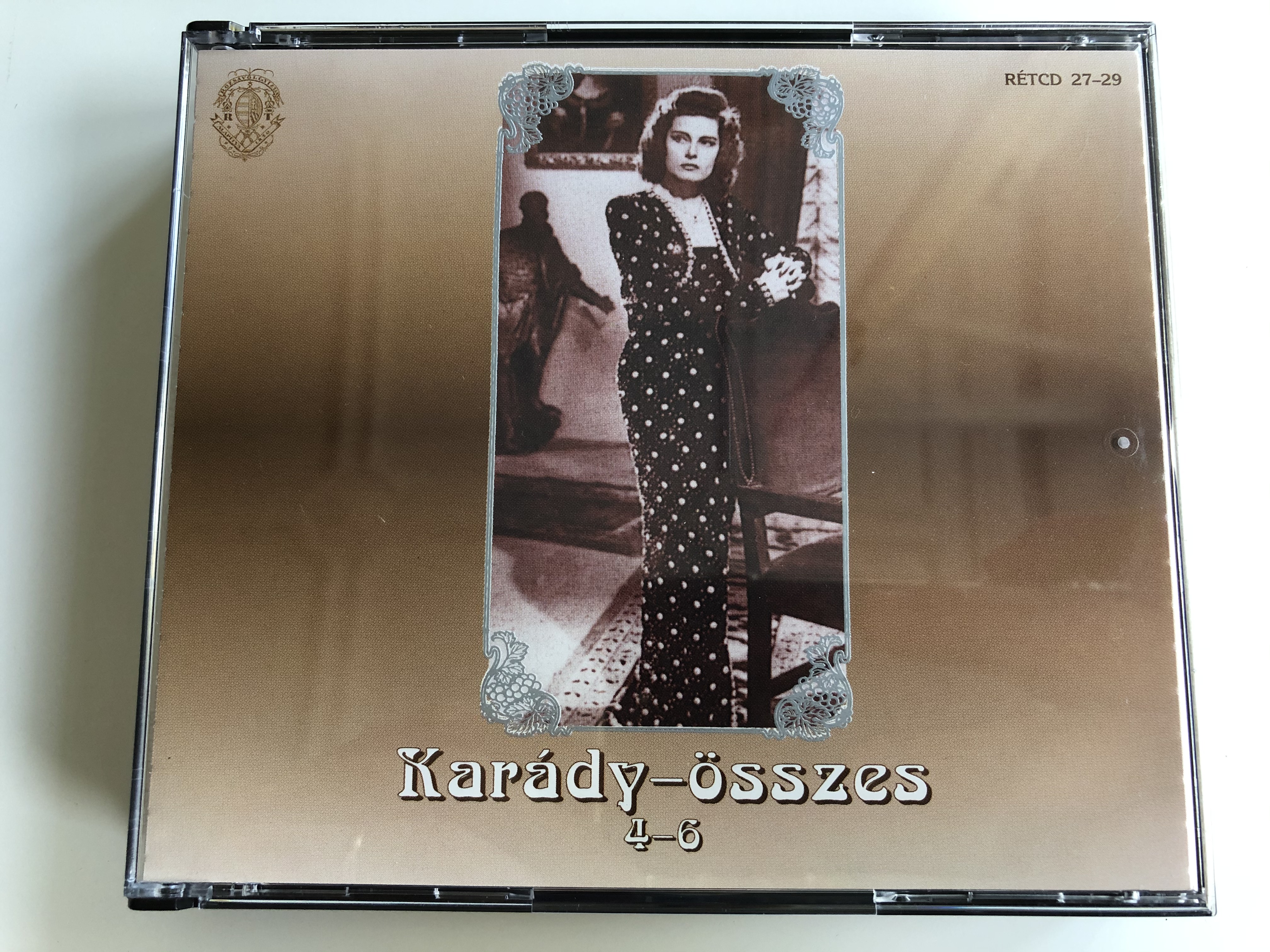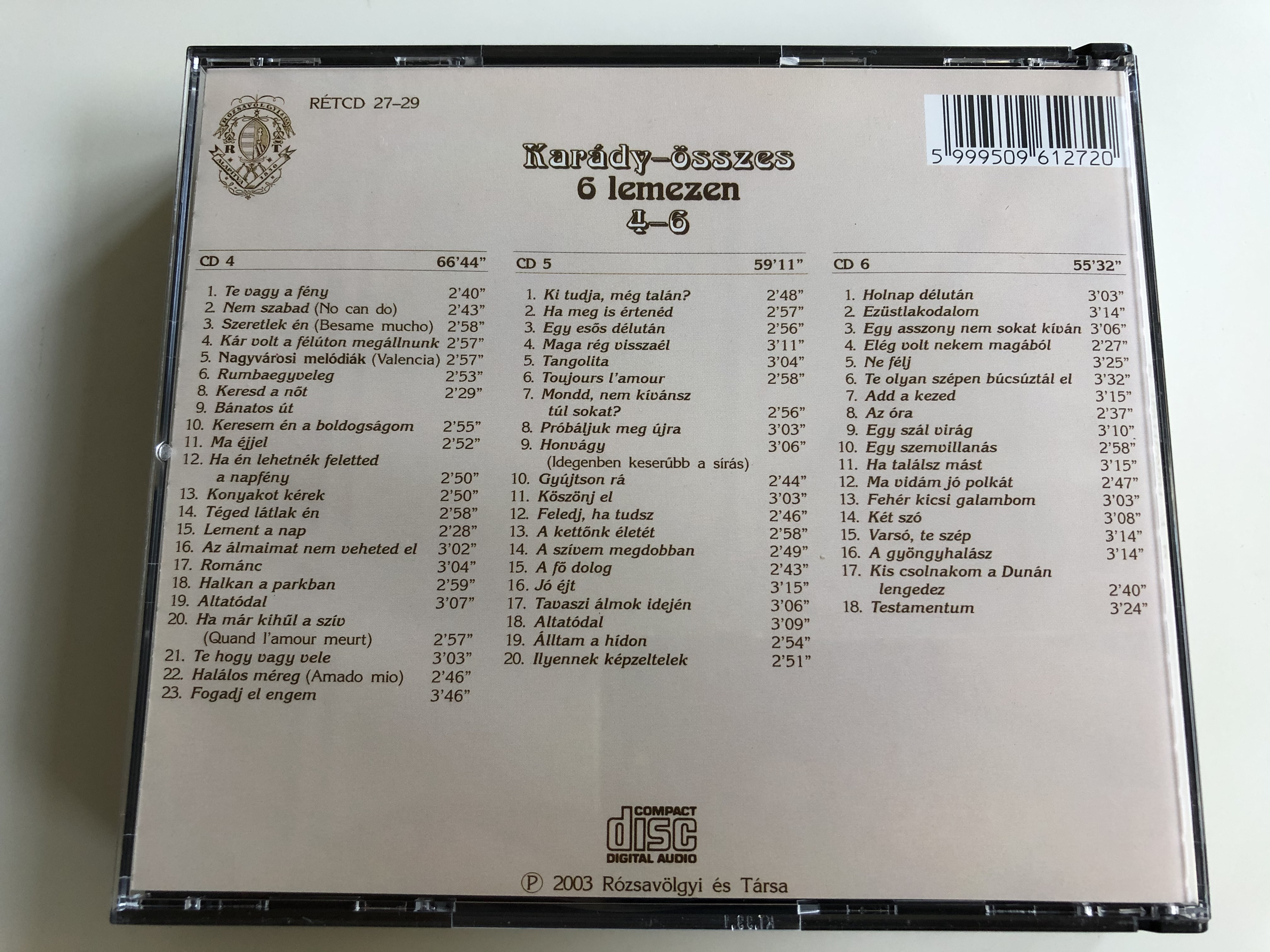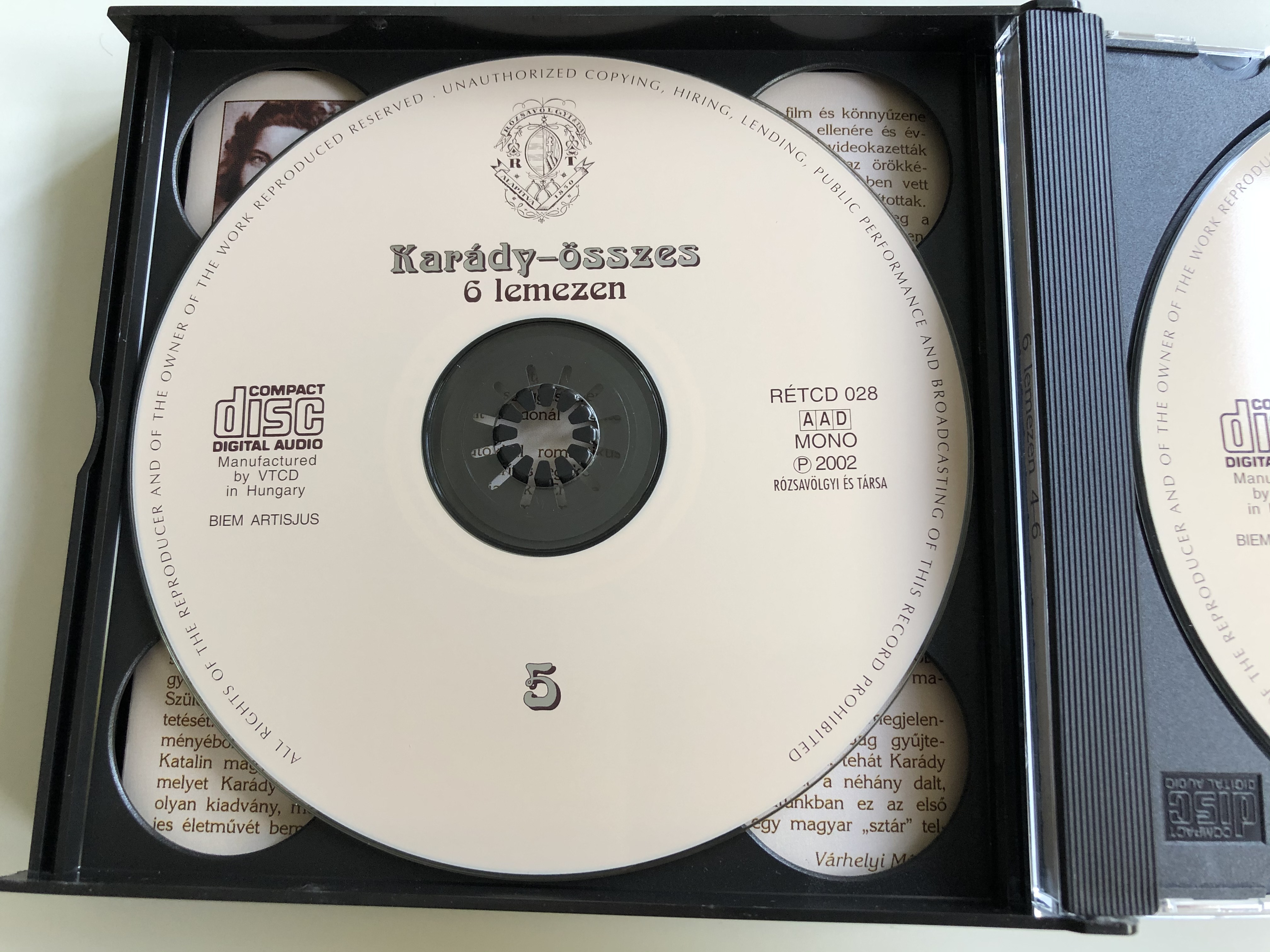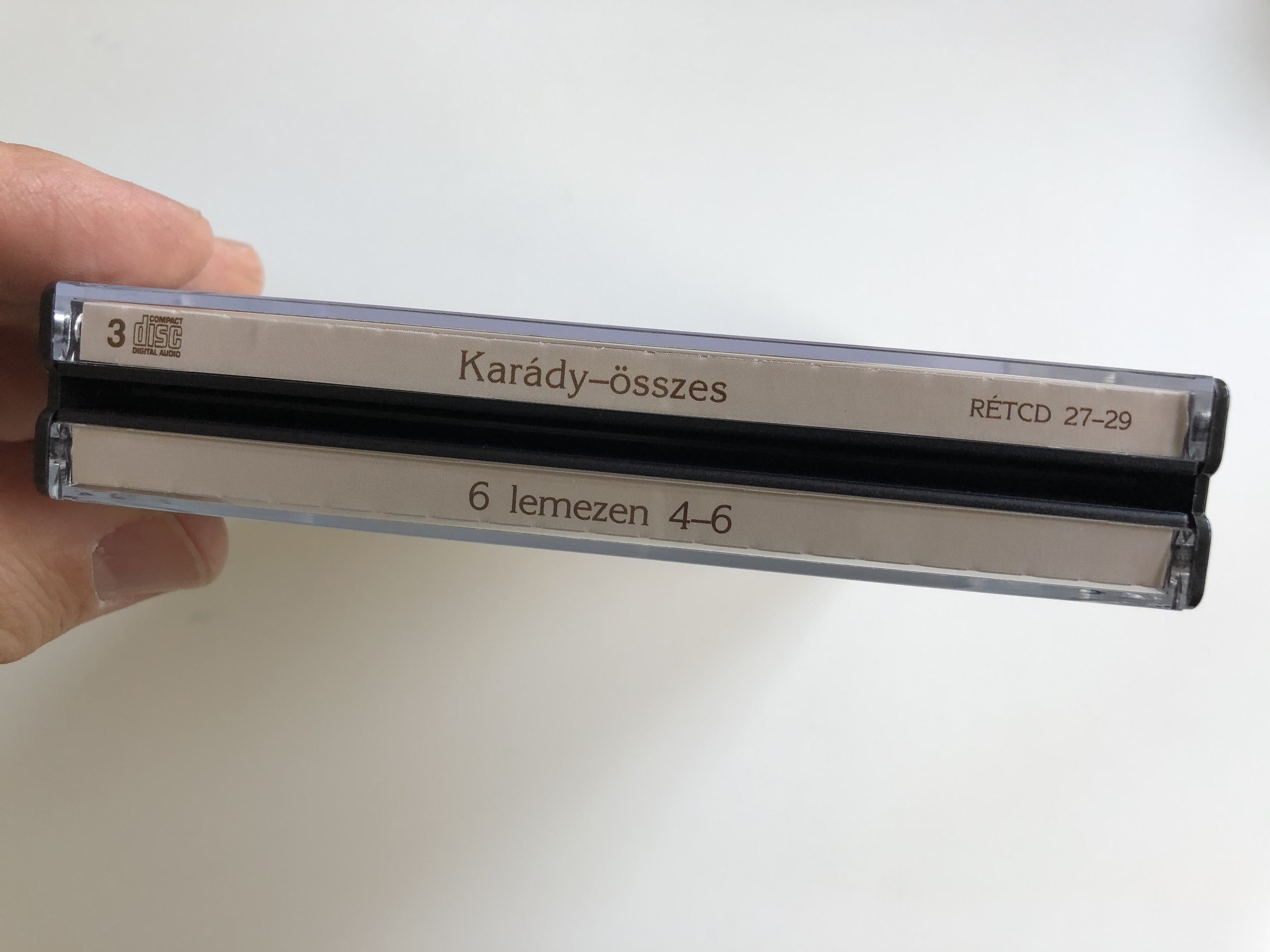Product Overview
Karády-összes 4-6 / Rózsavölgyi És Társa 3x Audio CD 2002 Mono / RÉTCD 27-29 / 61 Hungarian songs performed by Katalin Karády
UPC 5999509612720
Karády-összes 4-6, a Compilation of songs by Katalin Karády.
Kanczler Katalin (Budapest, 1910. december 8. - New York, 1990. február 8.)
Katalin Karády (8 December 1910 – 8 February 1990) was a Hungarian actress and singer. A leading actress in Hungarian movies made between 1939–1945, she is best known outside Hungary as an awardee of the Righteous among the Nations honour for rescuing a number of Hungarian Jews.
- Label: Rózsavölgyi És Társa – RÉTCD 27-29
- Format: 3x CD, Album
- Country: Hungary
- Released: 2002
Tracklist:
CD 4 - 66:44
1. HALÁSZ RUDOLF: Te vagy a fény 2:40
2. TOBIAS, CHARLES — SIMON, NAT — LANTOS OLIVÉR: Nem szabad (No can do) 2:43
3. VELASOUEZ, CONSUELO — FEKETE GYÖRGY: Szeretlek én (Besame mucho) 2:58
4. HEGEDÚS TAMÁS -— SZENES IVÁN: Kár volt a félúton megállnunk 2:57
5. PADILLA, JOSÉ — KOVÁCH ALADÁR: Nagyvárosi melódiák (Valencia) 2:57
6. YOUMANS, VINCENT - Ács ÁGNES: Rumbaegyveleg 2:53
8. DE SYLVA-BROWN, B. G. — YOUMANS, VINCENT — AcS ÁGNES: Keresd a nőt 2:29
9. DE FRIES KÁROLY — G. DÉNES GYÖRGY: Bánatos út
10. HORVÁTH JENÓ — HALÁSZ RUDOLF: Keresem én a boldogságom 2:55
A Csak nővel ne című zenés vígjátékból
11. KEMÉNY EGON — HALÁSZ RUDOLF: Ma éjjel 2:52
12. SZAVÁRY SÁNDOR - SURÁNYI LAJOS: Ha én lehetnék feletted a napfény 2:50
13. MALCSINER BÉLA: Konyakot kérek 2:50
14. HEGEDŰS TAMÁS — G. DÉNES GYÖRGY: Téged látlak én 2:58
15. ROMBERG, SIGMUND — KovÁCH ALADÁR: Lement a nap 2:28
16. BUDAY DÉNES — TISZAY ÁRPÁD: Az álmaimat nem veheted el 3:02
17. CSAJKOVSZKIJ, PJOTR — POLGÁR TIBOR — Ács ÁGNES: Románc 3:04
18. RUBINSTEIN, ANTON — BALASSA EMIL — SZABÓ MIKLÓS: Halkan a parkban 2:59
19. FLIES, BERNHARD — Ács ÁGNES: Altatódal 3:07
20. DREMIEuX — SZABÓ MIKLÓS: Ha már kihűl a szív (auand lamour mevurt) 2:57
21. Ács ÁGNES: Te hogy vagy vele 3:03
22. ROBERTS, ÁLLAN - FISHER, DORIS — SZENES IVÁN: Halálos méreg (Amado mio) 2:46
23. SZABÓ KÁLMÁN: Fogadj el engem 3:46
CD 5 - 59:11
1. CSAJKOVSZKIJ, PJOTR — SZENKÁR DEZSŐ j HALÁSZ RUDOLF: Ki tudja, még talán? 2:48
2. MENDELSSOHN-BARTHOLDY: FELIX — KOMÁROMI ANDOR — Acs AGNES: Ha meg is értenéd 2:57
3. MALCSINER BÉLA — ÁCS AGNES: Egy esős délután 2:56
4. BREITNER JÁNOS — SZILÁGYI ÖDÖN: Maga rég visszaél 3:11
5. ÁBRAHÁM PÁL — HELTAI JENŐ: Tangolita (a Bál a Savoyban c. operettből) 3:04
6. ÁBRAHÁM PÁL — HELTAI JENŐ: Toujours Vamour (a Bál a Savoyban c. operettből) 2:58
7. HEGEDŰS TAMÁS — SZENES IVÁN: Mondd, nem kívánsz túl sokat? 2:56
8. HORVÁTH JENÓ — RÁKOSI JÁNOS: Próbáljuk meg újra 3:03
9. DE FRIES KÁROLY - KRISTÓF KÁROLY: Honvágy (Idegenben keserűbb a sírás) 3:06
10. DE FRIES KÁROLY — KRISTÓF KÁROLY: Gyújtson rá 2:44
11. LÓRINCZY PÁL — SZÁSZ MIKLÓS — BENEDEK ERNŐ: Köszönj el 3:03
12. BREITNER JÁNOS — SZILÁGYI LÁSZLÓ: Feledj, ha tudsz 2:46
13. HAJDUu JÚLIA — RÁKOSI JÁNOS: A kettőnk életét 2:58
14. HAJDU JÚLIA — SZÉCSÉN MIHÁLY: A szívem megdobban 2:49
15. HAJDU JÚLIA — SZÉCSÉN MIHÁLY: A fő dolog 2:43
16. BRópY TAMÁS — G. DÉNES GYÖRGY: Jó éjt 3:15
17. SZERDAHELYI ZOLTÁN -— SZENES IVÁN: Tavaszi álmok idején 3:06
18. BRÓDY TAMÁS - RÁKOSI JÁNOS: Altatódal 3:09
19. HORVÁTH JENŐ — SZENES IVÁN: Álltam a hídon 2:54
20. ORLAY JENÓ (CHAPpY) — SZENES IVÁN: Ilyennek képzeltelek 2:51
CD 6 - 55:32
1. BUDAY DÉNES - SZÉCSÉN MIHÁLY: Holnap délután 3:03
2. SZTERÉNYI DÉNES — G. DÉNES GYÖRGY: Ezüstlakodalom 3:14
3. FoORGACS ÁDÁM: Egy asszony nem sokat kíván 3:06
4. FORGÁCS ÁDÁM - RÁKOSI JÁNOS: Elég volt nekem magából 2:27
5. MARTINY LAJOS — SZÉCSÉN MIHÁLY: Ne félj 3:25
6. SZÁDI LÁSZLÓ - RÁKOSI JÁNOS: Te olyan szépen búcsúztál el 3:32
7. BRODY TAMÁS -— ZOLTÁN PÁL: Add a kezed 3:15
(Lánchíd-dal, a Kulcs a lábtörlő alatt c. rádióoperettből)
8. BREITNER JÁNOS -— SZILÁGYI LÁSZLÓ: ÁZ óra 2:37
9. BUDAY DÉNES - SZÉCSÉN MIHÁLY: Egy szál virág 3:10
10. SZEGŐ ISTVÁN - KováTrs JÁNOs: Egy szemvillanás 2:58
11. GYÖNGY PÁL - RÁKosI JÁNOS: Ha találsz mást 3:15
12. FORCACS ÁDÁM - RÁKOSI JÁNOS: Ma vidám jó polkát 2:47
13. HORVÁTH JENŐ - SZÉCSÉN MIHÁLY: Fehér kicsi galambom 3:03
14. SZTERÉNYI DÉNES - ZÁGON ISTVÁN: Két szó 3:08
15. ZIELINSKY, M — IFJ. KÓVÁRI GYÖRGY: Varsó, te szép 3:14
16. BIZET, GEORGES - HORVÁTH JENÓ: A gyöngyhalász 3:14
17. ERDÉLYI MIHÁLY: Kis csolnakom a Dunán lengedez 2:40
(a Sárgarigófészek c. operettből)
18. BUDAY DÉNES - JUHÁSZ GYULA: Testamentum 3:24
Karády Katalin, született Kanczler Katalin Mária, (Budapest, Kőbánya, 1910. december 8. – New York, 1990. február 7.) magyar színésznő, kalapszalon-tulajdonos, sanzonénekes.
Early years
Katalin Karády was born as Katalin Kanczler, on 8 December 1910 in Budapest. She spent her childhood in the Kőbánya district with seven siblings in great poverty. Her parents were Rozália Lőrinc and Ferenc Kanczler, a shoemaker, whom Katalin remembered as an aggressive person. Helped by a charity organization, she spent five years in Switzerland and the Netherlands. After returning home, she studied in a Women's Marketing school, already famed for her beauty. With the language knowledge from previous years, her simple clothing and vigorous demand for cleanliness, she already stood out from her classmates. After her father's death in 1930, she married Rezső Varga, a customs official, 30 years older than herself, but they divorced after a few months.
She started acting in 1936, taking classes from Ernő Tarnay, and Artúr Bárdos. After gaining the attention of journalist Zoltán Egyed in a bar in Buda (who also proposed the name Karády) she was introduced to Ilona Aczél, a former actress, in whose acting school she learned the basics of the profession in the following three years, including singing. Karády's first performance was during the 1930s, in Dániel Jób's theatres: between 1931 and 1941, she appeared in the Pesti Színház and Vígszínház in various roles.
Becoming a star
Her first movie role, Halálos Tavasz (Deadly Spring) gave her instant fame as a diva and sex-symbol, supported by her unusual, humming voice, and "femme fatale" character. In the next nine years, she appeared in 20 movies. Zoltán Egyed became her manager, and successfully created a Hollywood-like image around her, as a result, thousands of fans tried to mimic her clothing, hairstyle and behavior throughout the country. Karády's personal life was a constant topic of gossip, conflicting rumors about she a man-eater, or lesbian. The theories were stirred up even more when she had an intimate relationship with Regent Miklós Horthy's secret service chief, István Ujszászy, who also proposed to her, and bought her a villa.
Downfall
After the German invasion of Hungary, authorities put pressure on Karády by banning her songs from the National Radio, her new film Machita from theatres, and stopping the ongoing production of Gazdátlan asszony (Orphan woman) (later the crew finished the movie with Erzsi Simor). In 1944 she was arrested with allegations that she spied for the Allied Forces. Karády was in prison for three months, during which time she was tortured, and nearly beaten to death. She was rescued by friends of Major General Ujszászy, in dire condition both physically and emotionally. Despite mishaps, she carried on with life in the war-torn capital, even rescuing numerous families at the bank of the Danube waiting to be shot by Arrow Cross guards, in exchange for personal belongings and gold which she had saved from her robbed apartment. She took a number of children home to care for them until the fighting stopped. In the summer of 1945 came news from Moscow that General Ujszászy was dead, though later evidence showed that at that time he was still alive. Suffering from a nervous breakdown, she lay in bed for the following nine months.
Later years
After the war, Karády became increasingly disregarded. Between 1945–48 she appeared in the Operettszínház in a few leading roles, the restarting Hungarian film production did not count on her (besides two movies, Forró mezők being her last). Being a popular star of the Horthy era, there was no place for her under the new communist rule. In 1949, all of her films were banned along with her theater appearances. She was taken by the authorities, was brutally beaten and abused, her teeth got knocked out etc. Only being able to work at small venues in the countryside, often with a drunk audience, she left the country in 1951 permanently. First she lived in Salzburg, Austria, then moved to Switzerland, and after a year to Brussels. In 1953, she lived in São Paulo, Brazil, opening a fashion shop. In 1968, finally receiving a visa after Ted and Robert Kennedy intervened, she moved to New York City, opening a hat salon. Performing rarely for friends only, she lived in retirement, refusing to appear in the media. Receiving a governmental invitation at her 70th birthday to return to Hungary, she only sent a hat, baffling officials. She died on 8 February 1990. On 19 February her body was transferred to Hungary; a memorial service was held in Budapest at the St. Stephen's Basilica, after which she was buried in Farkasréti Cemetery.






















